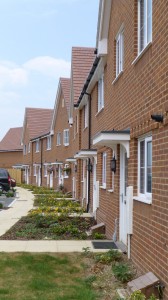 Affordable housing is being axed as house builders maximise profits. New legislation that came into force in April, is allowing house builders to fast track challenges to councils against section 106 agreements, provided they can show the provision of low-cost housing would affect the financial viability of their projects, making them uneconomical.
Affordable housing is being axed as house builders maximise profits. New legislation that came into force in April, is allowing house builders to fast track challenges to councils against section 106 agreements, provided they can show the provision of low-cost housing would affect the financial viability of their projects, making them uneconomical.
Many councils across the UK are giving in to house builders who are refusing to start building projects unless they deliver a healthy profit. In some of Britain’s biggest cities house builders and councils have torn up previously binding legal agreements to build affordable housing; which includes social, rented and shared ownership for specified eligible households that cannot afford to buy or rent on the open market.
A three-month investigation by Society Guardian has discovered that 60% of the largest housing developments currently in the planning system are falling short of affordable housing targets, meaning thousands of cheaper homes may never be built. The study revealed that not one of Birminghams’s largest housing developments meet its 35% affordable housing target.
In September last year David Cameron and Nick Clegg announced they intended to remove a ‘planning gain’ requirement which forced house builders to include low cost housing in return for planning permission for new developments. This came into force in April and has resulted in developers being able to renegotiate and challenge “onerous Section 106 requirements” signed before April 2010. Until 2016, house builders no longer have to wait five years to apply to councils to change affordable housing requirements, provided they can demonstrate the provision of affordable homes will mean a development becomes not commercially viable.
The survey has unsurprisingly, found examples of house builders using property consultants and financial viability assessments to repeatedly persuade councils that having larger affordable housing quotas would make their projects uneconomic. This often resulted in a reduction in the number of affordable homes based on projections indicating schemes will only be marginally profitable. A freedom of information request revealed that over five years, more than 2,300 affordable homes have been axed from housing schemes, despite builders and councils signing legal agreements that specified these homes will be built. House builder’s financial results are confirming they have been building more homes for private sale and fewer affordable homes on their sites.
It is increasingly being left to housing associations to provide the supply of low-cost housing. However in the June spending review, George Osborne announced that housing associations would receive only £3.3bn in the three years from 2015, a cut of 2.2% in addition to the overall 63% funding reduction made in 2010.
The number of people in England on council waiting lists is around 1.85million – up 69% in ten years. As of June there were 56,210 households in temporary accommodation, a rise of 9% in 12 months. Despite this, the number of affordable housing starts backed by the government funded Homes and Communities Agency is 33% lower than when the coalition came to power.
In June, Labour leader Ed Miliband brought attention to how national priorities have moved away from building new homes saying: “Thirty years ago, for every £100 we spent on housing, £80 was invested in bricks and mortar and £20 was spent on housing benefit. Today, for every £100 we spend on housing, just £5 is invested in bricks and mortar and £95 goes on housing benefit.” citing the interactions between welfare changes, low wages, insecure employment, a private housing sector resulting in this shameful set of statistics.





